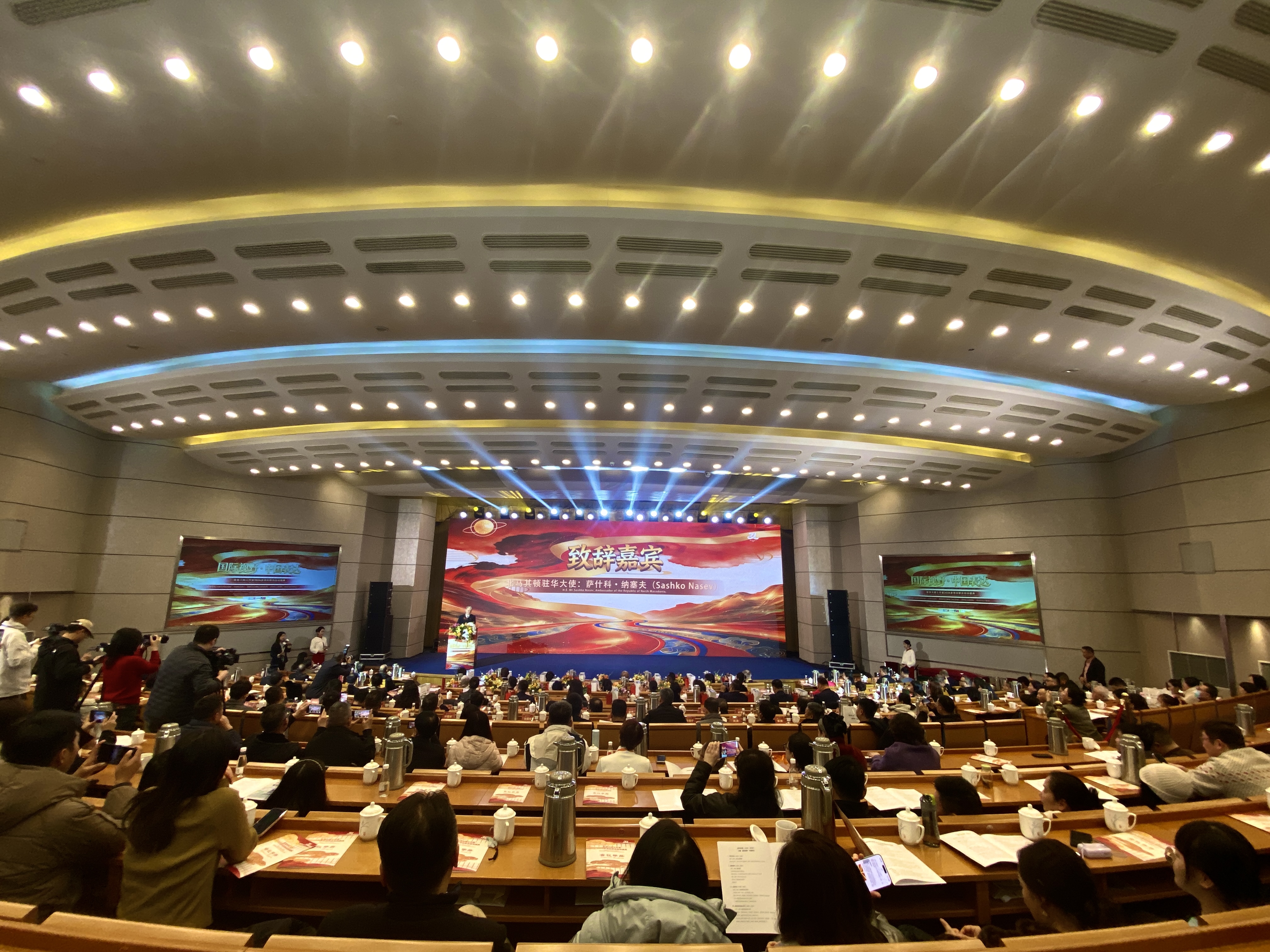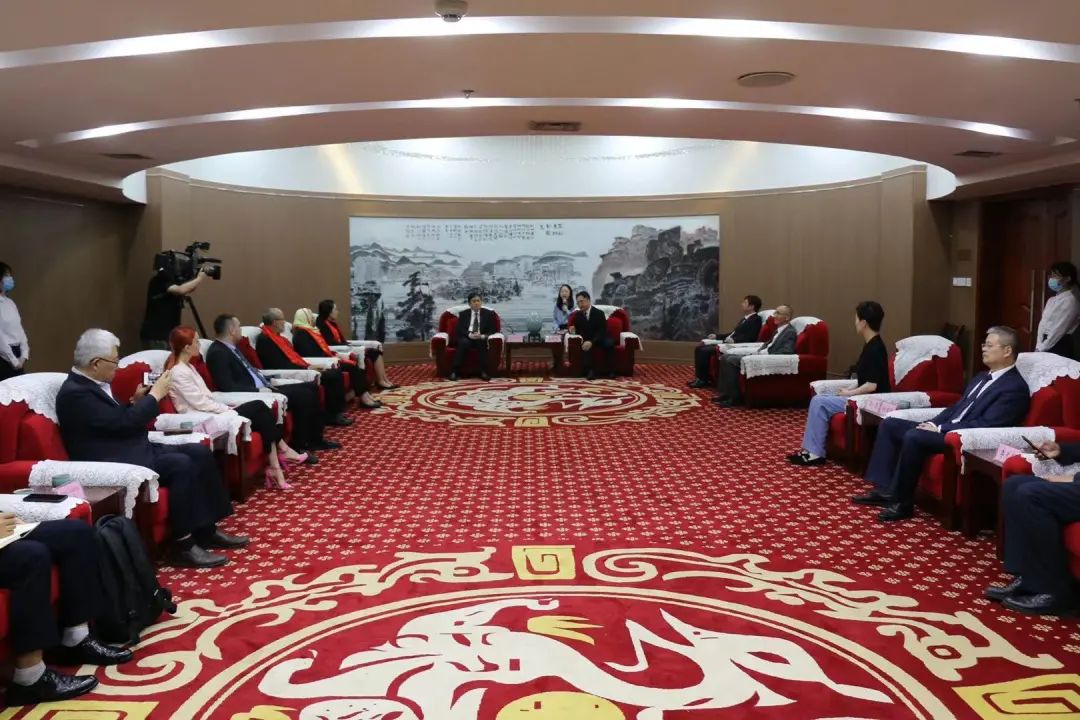美国还未认识到世界秩序正在发生改变
来源:
作者:James O’Neill* 点击:
发布时间:2021-06-16 09:45:07
中国国际教育电视台讯:2021年6月2日—5日,俄罗斯圣彼得堡举行了近期最重要的经济论坛之一——圣彼得堡国际经济论坛。全球170多个国家代表出席此次会议(部分以线上方式参会)。西方主流媒体对此仅有少量报道。
此次论坛对全球新经济秩序进行了重要讨论,即经济重心从西方转移到东方。在过去 至少200 年里,西方始终是世界经济重心。
有很多迹象可以表明世界经济重心在发生根本性转变。其中,美元在国际贸易中的地位不断下降。国际货币基金组织总裁克里斯塔利娜·格奥尔基耶娃( Kristalina Georgieva )、俄罗斯中央银行行长埃尔维拉·内比乌林娜(Elvira Nebiullina )和俄罗斯财政部长安东·西卢安诺夫(Anton Germanovich Siluanov )曾在一次会议的论坛上共同讨论了这个问题。
西卢阿诺夫表示,今年5月,俄罗斯仅有不到50%的出口产品是以美元来计价的。他宣布,俄罗斯打算彻底放弃美元在俄罗斯的财富基金。这是俄罗斯外汇体系重大重组的一部分。
英镑的作用也出现了被削弱的迹象。欧元和人民币的作用将得到加强,黄金和日元的地位也将保持稳定。
此次论坛的的另一个讨论主题是中国在欧亚经济中作用日益增强。将中国的技术能力和俄罗斯庞大的能源资源相结合,为欧亚市场奠定基础,从而逐步削弱西方一直以来在世界经济中的主导地位。
美国数十年来滥用其作为世界主要贸易货币来源国的权力,是推动世界经济重心转移的主要因素之一。过去几十年来,这种权力的使用显然变成了滥用,以俄罗斯和中国为首的国家放弃美元,是这种权力滥用所导致的最明显的结果之一。
此次论坛的召开时间也值得注意。这次论坛选择在七国集团峰会和北约峰会的前几天,以及在日内瓦举行的拜登-普京(Biden – Putin)峰会的前两周。最近几周,美国与俄罗斯在一些分歧上有所缓和,特别是美国不再反对完成向德国和欧洲其他地方提供俄罗斯天然气管道。美国显然对能够在日内瓦会议上取得地缘政治成果抱有期望。
俄罗斯清楚地意识到美国试图将他们与中国分开,美国越来越多反感中国。俄罗斯和中国的伙伴关系已经发展深厚,美国不可能分离两者之间的关系。
上海合作组织发挥着越来越大的作用,这是俄中合作的一个突出例子。上海合作组织目前有8个成员国,其中出人意料的是巴基斯坦和印度在共同利益的基础上展开合作;其中4个观察员国,包括对美国未来有一定兴趣的阿富汗;还有6个对话国,其成员遍布欧亚地区。
连同其他重要区域集团包括国际南北运输走廊和起源于俄罗斯的欧亚经济联盟,2010年,随着欧亚关税同盟的实施和2011年8个国家签署的自由贸易协定,欧亚经济联盟在缓慢起步后成为一个重要的组织。值得注意的是,这些不同组织的成员身份有所重叠。他们有一个共同点,即希望有一套非西方主导的世界经济秩序来管理经济及其他问题。
普京总统最近表示了俄罗斯对这些事态发展的看法。在对未来发展的广泛讨论中,普京直接将前苏联和美国进行了比较。据路透社消息,美国认为自己“足够强大”并强大到有能力威胁任意国家并逍遥法外,这一说法是错误的。普京表示,这个错误导致了前苏联的垮台。
据俄罗斯塔斯社(Tass)报道,普京在周五晚些时候的新闻发布会上发表了上述言论,当时他谈到了美国对莫斯科的制裁。
此背景下,普京将与拜登在日内瓦进行会晤。没有理由能够让俄国对美国做出任何重大让步。
世界上的秩序和各国地位正在发生变化。过分依赖美国来发现这些变化也许是不明智的。
Last week in Saint Petersburg, Russia, one of the most important economic forums of recent times was held. It was the Saint Petersburg International Economic Forum (SPIEF). Although attended, in person or electronically, by representatives of more than 170 countries across the world, it barely attracted a mention in the western mainstream media.
The forum provided the opportunity for a major discussion of what might fairly be described is the new economic order: the shift of economic emphasis from the West, where it has prevailed for the past 200 years at least, to the East.
There are many symptoms of this fundamental shift in the world’s economic focus. An obvious one is the steady decline of the United States dollar as the medium for international trade. This was discussed at one of the forums of the conference where IMF managing director Kristalina Georgieva, Russian central bank Governor Elvira Nebiullina and Russian minister of finance Anton Siluanov shared a forum.
Siluanov announced that in May of this year for the first time, less than 50% of Russia’s exports were nominated in United States dollars. Siluanov announced that Russia intended to totally abandon the United States dollar in the Russian wealth fund. This was part of a major restructuring of the Russian foreign exchange system.
The role of the British pound was also to be reduced . The role of the Euro and Chinese Yuan would also be increased, with the status of gold and the Japanese yen remaining stable.
A further topic of discussion at SPIEF was the increasing role of the Chinese in Eurasia’s economy. A combination of Chinese technical capability and Russia’s massive energy resources will provide the foundation of an Eurasian market that will progressively diminish the West’s hitherto dominant role.
One of the principal factors driving the change is decades of United States abuse of the power they retained as the source of the world’s main trading currency. When the use of that power turned to abuse, as has been manifestly obvious for the past several decades, it inevitably produces a reaction. The Russian and Chinese led abandoning of the dollar is the obvious outcome of the growing disenchantment with decades of United States abuse of its position.
The timing of the SPIEF conference is also notable. It occurred in the days before the G7 and NATO summits and two weeks before the Biden – Putin summit set to occur in Geneva. Together with a softening of some points of difference with Russia in recent weeks, and notably with the withdrawal of United States opposition to the completion of the pipeline providing Russian gas to Germany and elsewhere in Europe. The United States clearly has expectations of making geopolitical gains at the Geneva meeting.
The Russians are plainly aware of United States attempts to separate them from China, upon whom the Americans are increasingly concentrating their antipathy. The Russian-China partnership has developed too far to make any fantasy of a United States inspired separation feasible.
An outstanding example of Russia – China Corporation can be seen in the progressively greater role being played by the Shanghai Cooperation Organisation. The SCO currently has eight member states, including somewhat surprisingly Pakistan and India cooperation in their mutual interests, four observer states, including, of particular interest, Afghanistan, looking to a post United States future, and six dialogue states. Its membership spans the Eurasian region.
Along with other important regional groupings such as the International North South Transportation Corridor, and the Russian originated Eurasian Economic Union, which after a slow start became a serious body in 2010 with the implementation of the Eurasian Customs Union and the 2011 signing by eight countries of a free trade agreement. It is notable that there is overlapping membership of these different organisations. One thing they have in common is the desire for a non-western dominated set of arrangements to govern their economies, and increasingly other, concerns.
The Russian perspective on these developments was recently provided by President Putin. In a wide-ranging discussion on future developments, Putin drew a direct parallel with the Soviet Union and the United States. As quoted by Reuters, Putin said the United States was wrong to think that it is “powerful enough” to get away with threatening other countries, a mistake he said, that led to the downfall of the Soviet Union.
Putin made the comments during a meeting late on Friday as he spoke about United States sanctions against Moscow, according to Russia’s news agency Tass.
It is this background that Putin will bring to his meeting in Geneva with Biden. There was no reason to expect the Russians to make any significant concessions to the Americans.
The world is changing. Whether he and his advisors have the wit to recognise the impact of these changes remains an open question. It would perhaps be unwise to place too much reliance upon an American capacity for insight into these changing realities.
(责任编辑:James O’Neill*)
此次论坛对全球新经济秩序进行了重要讨论,即经济重心从西方转移到东方。在过去 至少200 年里,西方始终是世界经济重心。
有很多迹象可以表明世界经济重心在发生根本性转变。其中,美元在国际贸易中的地位不断下降。国际货币基金组织总裁克里斯塔利娜·格奥尔基耶娃( Kristalina Georgieva )、俄罗斯中央银行行长埃尔维拉·内比乌林娜(Elvira Nebiullina )和俄罗斯财政部长安东·西卢安诺夫(Anton Germanovich Siluanov )曾在一次会议的论坛上共同讨论了这个问题。
西卢阿诺夫表示,今年5月,俄罗斯仅有不到50%的出口产品是以美元来计价的。他宣布,俄罗斯打算彻底放弃美元在俄罗斯的财富基金。这是俄罗斯外汇体系重大重组的一部分。
英镑的作用也出现了被削弱的迹象。欧元和人民币的作用将得到加强,黄金和日元的地位也将保持稳定。
此次论坛的的另一个讨论主题是中国在欧亚经济中作用日益增强。将中国的技术能力和俄罗斯庞大的能源资源相结合,为欧亚市场奠定基础,从而逐步削弱西方一直以来在世界经济中的主导地位。
美国数十年来滥用其作为世界主要贸易货币来源国的权力,是推动世界经济重心转移的主要因素之一。过去几十年来,这种权力的使用显然变成了滥用,以俄罗斯和中国为首的国家放弃美元,是这种权力滥用所导致的最明显的结果之一。
此次论坛的召开时间也值得注意。这次论坛选择在七国集团峰会和北约峰会的前几天,以及在日内瓦举行的拜登-普京(Biden – Putin)峰会的前两周。最近几周,美国与俄罗斯在一些分歧上有所缓和,特别是美国不再反对完成向德国和欧洲其他地方提供俄罗斯天然气管道。美国显然对能够在日内瓦会议上取得地缘政治成果抱有期望。
俄罗斯清楚地意识到美国试图将他们与中国分开,美国越来越多反感中国。俄罗斯和中国的伙伴关系已经发展深厚,美国不可能分离两者之间的关系。
上海合作组织发挥着越来越大的作用,这是俄中合作的一个突出例子。上海合作组织目前有8个成员国,其中出人意料的是巴基斯坦和印度在共同利益的基础上展开合作;其中4个观察员国,包括对美国未来有一定兴趣的阿富汗;还有6个对话国,其成员遍布欧亚地区。
连同其他重要区域集团包括国际南北运输走廊和起源于俄罗斯的欧亚经济联盟,2010年,随着欧亚关税同盟的实施和2011年8个国家签署的自由贸易协定,欧亚经济联盟在缓慢起步后成为一个重要的组织。值得注意的是,这些不同组织的成员身份有所重叠。他们有一个共同点,即希望有一套非西方主导的世界经济秩序来管理经济及其他问题。
普京总统最近表示了俄罗斯对这些事态发展的看法。在对未来发展的广泛讨论中,普京直接将前苏联和美国进行了比较。据路透社消息,美国认为自己“足够强大”并强大到有能力威胁任意国家并逍遥法外,这一说法是错误的。普京表示,这个错误导致了前苏联的垮台。
据俄罗斯塔斯社(Tass)报道,普京在周五晚些时候的新闻发布会上发表了上述言论,当时他谈到了美国对莫斯科的制裁。
此背景下,普京将与拜登在日内瓦进行会晤。没有理由能够让俄国对美国做出任何重大让步。
世界上的秩序和各国地位正在发生变化。过分依赖美国来发现这些变化也许是不明智的。
Last week in Saint Petersburg, Russia, one of the most important economic forums of recent times was held. It was the Saint Petersburg International Economic Forum (SPIEF). Although attended, in person or electronically, by representatives of more than 170 countries across the world, it barely attracted a mention in the western mainstream media.
The forum provided the opportunity for a major discussion of what might fairly be described is the new economic order: the shift of economic emphasis from the West, where it has prevailed for the past 200 years at least, to the East.
There are many symptoms of this fundamental shift in the world’s economic focus. An obvious one is the steady decline of the United States dollar as the medium for international trade. This was discussed at one of the forums of the conference where IMF managing director Kristalina Georgieva, Russian central bank Governor Elvira Nebiullina and Russian minister of finance Anton Siluanov shared a forum.
Siluanov announced that in May of this year for the first time, less than 50% of Russia’s exports were nominated in United States dollars. Siluanov announced that Russia intended to totally abandon the United States dollar in the Russian wealth fund. This was part of a major restructuring of the Russian foreign exchange system.
The role of the British pound was also to be reduced . The role of the Euro and Chinese Yuan would also be increased, with the status of gold and the Japanese yen remaining stable.
A further topic of discussion at SPIEF was the increasing role of the Chinese in Eurasia’s economy. A combination of Chinese technical capability and Russia’s massive energy resources will provide the foundation of an Eurasian market that will progressively diminish the West’s hitherto dominant role.
One of the principal factors driving the change is decades of United States abuse of the power they retained as the source of the world’s main trading currency. When the use of that power turned to abuse, as has been manifestly obvious for the past several decades, it inevitably produces a reaction. The Russian and Chinese led abandoning of the dollar is the obvious outcome of the growing disenchantment with decades of United States abuse of its position.
The timing of the SPIEF conference is also notable. It occurred in the days before the G7 and NATO summits and two weeks before the Biden – Putin summit set to occur in Geneva. Together with a softening of some points of difference with Russia in recent weeks, and notably with the withdrawal of United States opposition to the completion of the pipeline providing Russian gas to Germany and elsewhere in Europe. The United States clearly has expectations of making geopolitical gains at the Geneva meeting.
The Russians are plainly aware of United States attempts to separate them from China, upon whom the Americans are increasingly concentrating their antipathy. The Russian-China partnership has developed too far to make any fantasy of a United States inspired separation feasible.
An outstanding example of Russia – China Corporation can be seen in the progressively greater role being played by the Shanghai Cooperation Organisation. The SCO currently has eight member states, including somewhat surprisingly Pakistan and India cooperation in their mutual interests, four observer states, including, of particular interest, Afghanistan, looking to a post United States future, and six dialogue states. Its membership spans the Eurasian region.
Along with other important regional groupings such as the International North South Transportation Corridor, and the Russian originated Eurasian Economic Union, which after a slow start became a serious body in 2010 with the implementation of the Eurasian Customs Union and the 2011 signing by eight countries of a free trade agreement. It is notable that there is overlapping membership of these different organisations. One thing they have in common is the desire for a non-western dominated set of arrangements to govern their economies, and increasingly other, concerns.
The Russian perspective on these developments was recently provided by President Putin. In a wide-ranging discussion on future developments, Putin drew a direct parallel with the Soviet Union and the United States. As quoted by Reuters, Putin said the United States was wrong to think that it is “powerful enough” to get away with threatening other countries, a mistake he said, that led to the downfall of the Soviet Union.
Putin made the comments during a meeting late on Friday as he spoke about United States sanctions against Moscow, according to Russia’s news agency Tass.
It is this background that Putin will bring to his meeting in Geneva with Biden. There was no reason to expect the Russians to make any significant concessions to the Americans.
The world is changing. Whether he and his advisors have the wit to recognise the impact of these changes remains an open question. It would perhaps be unwise to place too much reliance upon an American capacity for insight into these changing realities.
版权及免责声明
1、本网转载媒体稿件旨在传播更多有益信息,并不代表同意该观点,本网不承担稿件侵权行为的连带责任;
2、在本网博客/论坛发表言论者,文责自负。
推荐文章
热点内容
-
 张录工作室2026多项目联合计划
中国国际教育电视台讯:1月31日,“张录大师工作室2026多项目联合启动盛典”在浙江省人民大会堂国际会议厅隆重举行。本次活动由中国国际教育电视台、张录大师工作室
张录工作室2026多项目联合计划
中国国际教育电视台讯:1月31日,“张录大师工作室2026多项目联合启动盛典”在浙江省人民大会堂国际会议厅隆重举行。本次活动由中国国际教育电视台、张录大师工作室
-
 CECTV《声起东方》全球中文经
制片主任:李敏
CECTV《声起东方》全球中文经
制片主任:李敏
- ・《少林点穴的隐秘力量》纪录片在郑州圆满杀青
- ・2025GT世界挑战赛北京亦庄站启幕
- ・北京市侨联召开海外北京会座谈交流会
- ・2025GT世界挑战赛北京亦庄站圆满落幕
- ・短片【未封存的岁月日记】的时代意义
- ・侨智未来·创新人才发展活动举办
- ・2025GT世界挑战赛北京亦庄站筹备进入冲刺阶段
- ・无锡味道 世界共享LA LISTE 2025全球美食
- ・2025“校园星主播”国际展演(韩国站)圆满结束
- ・“勇气少年团”综艺节目开始选拨啦
- ・CECTV《声起东方》全球中文经典朗读节目
- ・美国迈阿密大学访问学者项目
- ・2012第二届中国国际积极心理学大会
- ・首届世界香具文化大会暨高峰论坛在浙江龙泉圆满召开
最新文章
- ・张录工作室2026多项目联合计划在杭启幕 构建文化出
- ・AI漫剧人才评价标准研讨会在京举行
- ・百集电视访谈栏目《健康大讲堂》----磷虾油与健康第
- ・百集电视访谈栏目《健康大讲堂》----特医食品与健康
- ・“汇聚力量·点燃希望”大手牵小手“我和星宝过大年”暨
- ・古巴民族英雄何塞·马蒂诞辰173周年暨菲德尔·卡斯特
- ・以象为维 医艺新章
- ・百集电视访谈栏目《健康大讲堂》----特医食品与健康
- ・百集电视访谈栏目《健康大讲堂》----维生素k2与健
- ・首次披露“七个一”工程,民营经济高质量发展丰台大会召
- ・CECTV《声起东方》全球中文经典朗读节目
- ・“勇气少年团”综艺节目开始选拨啦
- ・2025“校园星主播”国际展演(韩国站)圆满结束
- ・首届世界香具文化大会暨高峰论坛在浙江龙泉圆满召开
- ・2012第二届中国国际积极心理学大会
- ・美国迈阿密大学访问学者项目








